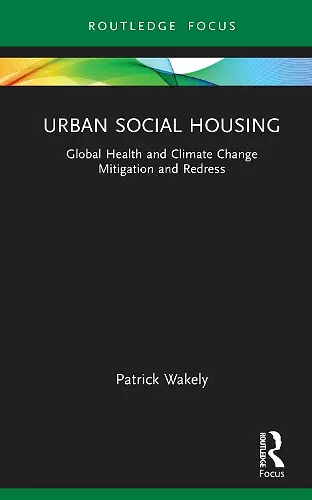Urban Social Housing
Global Health and Climate Change Mitigation and Redress
Format:Hardback
Publisher:Taylor & Francis Ltd
Published:19th Feb '24
Currently unavailable, and unfortunately no date known when it will be back

This book proposes operational approaches to public sector support to community-led development of urban low-income group social housing in the prevailing and medium-term. Within the context of mitigating and redressing the existential threats of climate change and global pathogenic transmission, building on current concerns of global heating and the lessons learnt from the 2020-22 COVID-19 pandemic, the book closely examines recent examples from a wide international range of countries and cities from the Sri Lanka experience to Arab States of the Middle East and the Andes. Topics include maintenance and management of public sector housing, poverty alleviation objectives, climate change mitigation, housing density, local land management and planning, land rights, affordable housing markets, and international governance and administration, ultimately pointing to the universal need for institutional, organisational and human skills development and the compilation and dissemination of operationally successful examples of participatory partnerships for affordable social housing. The book will be of interest to researchers, instructors, practitioners, and students of urban development, housing, environmental design, land-use planning, public administration and environmental health engineering.
‘Responses to the need for low-income urban housing have evolved over the past 80 years. It is still evolving, influenced even more so now by the climate crisis and the need to consider public health. In this book, Professor Wakely captures the essence of these and other key determinants in influencing that evolution, including land tenure, land use management, financing, and the need for ongoing partnership and collaboration. This book is a valuable resource for those engaged in low-income urban housing and must contribute to shaping future strategies and responses for all role players in this field.’
Greg Munro, Director, Cities Alliance, Belgium
‘Departing from the critical distinction between "public" and "social" housing, this book offers a historical account of the evolution of housing policies from the twentieth century to the present day. In doing so, it examines the travelling of policy and legal framings across the so-called Global North and South and the emergence and recognition of collective processes of social production of habitat, adopted in the commodified production of housing through the State and/or the private sector.
Professor Wakely takes us through this journey while looking at why the right to adequate housing cannot be advanced in dissociation from other contemporary crises, notably the climate emergency and the global health crisis that last manifested through the COVID-19 pandemic of 2020–2023. The book is important reading for those seeking to understand the trajectory of different narratives and approaches to today’s debates on urban social housing.’
Adriana Allen, University College London, UK
‘The recent COVID-19 pandemic and the fast-growing global warming process have both highlighted the centrality of housing and health conditions in urban areas: more than ever, discussion of housing policies is imperative. In an increasingly urbanised world, it is urgently necessary to critically understand the limits and possibilities of the range of strategies aiming to provide access to housing, especially for the more vulnerable groups and for the urban poor.
We must all learn from the lessons already available, such as those so well organised by Professor Patrick Wakely in this important and timely book. Written with precision as a result of decades of reflection, research, teaching and action in several countries, the book articulates information, analysis, and original proposals for the formulation of answers to the global housing crisis. It is a fundamental reading for urban managers, development agencies, academics, students and members of social movements.’
Edesio Fernandes, Urban and Environmental Researcher, Brazil
‘In this concise work, Pat Wakely draws on his extensive academic and professional experience to capture the essential characteristics of the post-war urban social housing policy development, including recent times. Focusing primarily on the Global South, and drawing on some of the key examples from the Global North, he identifies important lessons for policy makers including key reflections for addressing the new challenges posed by global heating and potential future pandemics. In particular he highlights the critical role of subsidiarity and participatory partnerships between key public and community actors to enable effective policy interventions for social housing delivery.’
Ramin Keivani, Oxford Brookes University, UK
ISBN: 9781032737065
Dimensions: unknown
Weight: 240g
86 pages